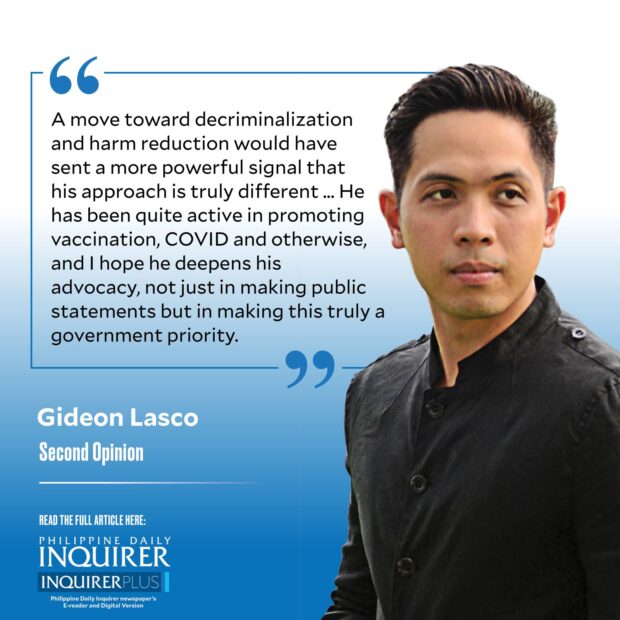Marcos Jr. on drugs, health
Dumaguete—Themed “Centering the Social Sciences in Future-proof Health and Well-Being,” the 10th National Social Science Congress here in Silliman University is a wonderful occasion to reflect on President Marcos’ State of the National Address, especially on health (construed broadly) and drugs (which is also a health issue).
Helpfully, the conference organized by the Philippine Social Science Council covers a broad range of topics (from medical tourism to traditional medicine), disciplines (from history to anthropology), and perspectives (rural to urban) to inspire my thinking.
Article continues after this advertisementIn terms of drug policy, Mr. Marcos mostly restated his previous positions on the subject matter. Denouncing police involvement in the drug trade, he stated that “the campaign against illegal drugs … has taken on a new face” and that the emphasis will be “community-based treatment, rehabilitation, education, and reintegration.”
But with Republic Act No. 9165 still in place, the government is still operating within the same punitive paradigm that harshly punishes small drug offenses and predisposes to police corruption, ultimately doing far more harm than the drugs themselves (note the existence of extrajudicial killings before and after former president Rodrigo Duterte).
A move toward decriminalization and harm reduction would have sent a more powerful signal that his approach is truly different, and I am calling on the President to make this commitment and follow it through.
Article continues after this advertisementMeanwhile, the President’s agenda on health—one of the three “armas” (weapons) that he said that would strengthen the ability of Filipinos to improve their lives—is of particular interest especially as we move past the pandemic and as Dr. Teodoro Herbosa takes the helm of the health department.
“We are now refocusing our health priorities, applying the lessons learnt from the pandemic and addressing the weaknesses that it has exposed,” said Mr. Marcos in the opening part of his 664-word discourse on health.
First on his list was “hunger and nutrition-related issues among our people, especially the children, like stunting and wasting.” Malnutrition among children has long been a major concern but addressing it will take coordination and close collaboration between the Department of Health (DOH), the Department of Education, and the Department of Science and Technology’s Food and Nutrition Research Institute, as well as sustained commitment to some of the feeding programs—woefully interrupted during the pandemic—that the President mentioned.
Next, he mentioned vaccination, stating that “more than 80 percent of our eligible children have been vaccinated against measles, rubella, and polio.” In fairness to the President, he has been quite active in promoting vaccination, COVID and otherwise, and I hope he deepens his advocacy, not just in making public statements but in making this truly a government priority. The 80-percent rate is still far from ideal—we are still suffering the consequences of the dengue vaccine scandal and we still face the risk of periodic measles outbreaks.
To truly bring our country to the rates achieved by Japan and Cuba, institutions like DOH must invest in cultivating public trust, drawing inspiration from the way Dr. Juan Flavier and Dr. Jaime Galvez-Tan engaged the public in the 1990s; even if people want to get vaccinated, there are also questions of accessibility and availability especially in rural areas.
The President then made passing reference to “the alarming rise of tuberculosis (TB) and HIV/AIDS,” stating that “the strategic plan is to ensure early diagnosis and treatment, and ample testing sites and medications.” I would’ve wanted to see a longer discussion on this two key issues, with the President himself promoting condom and pre-exposure prophylaxis use for HIV prevention, and declaring TB—a disease that killed more Filipinos than COVID-19 last year—as a national health emergency. Recently, Herbosa announced a new four-month regimen for TB (from the current six months); such a game-changing development (TB treatment has always been undermined by the sheer length and the multiple medicines’ side effects) should be a starting point for renewed action, advocacy, and research to once and for all tackle a disease that has long plagued our nation.
In my next column, I will continue my reflections on the President’s health agenda, particularly his claim that “healthier communities and lifestyles are our advocacy.”
—————-
glasco@inquirer.com.ph
For more news about the novel coronavirus click here.
What you need to know about Coronavirus.
For more information on COVID-19, call the DOH Hotline: (02) 86517800 local 1149/1150.
The Inquirer Foundation supports our healthcare frontliners and is still accepting cash donations to be deposited at Banco de Oro (BDO) current account #007960018860 or donate through PayMaya using this link.

















